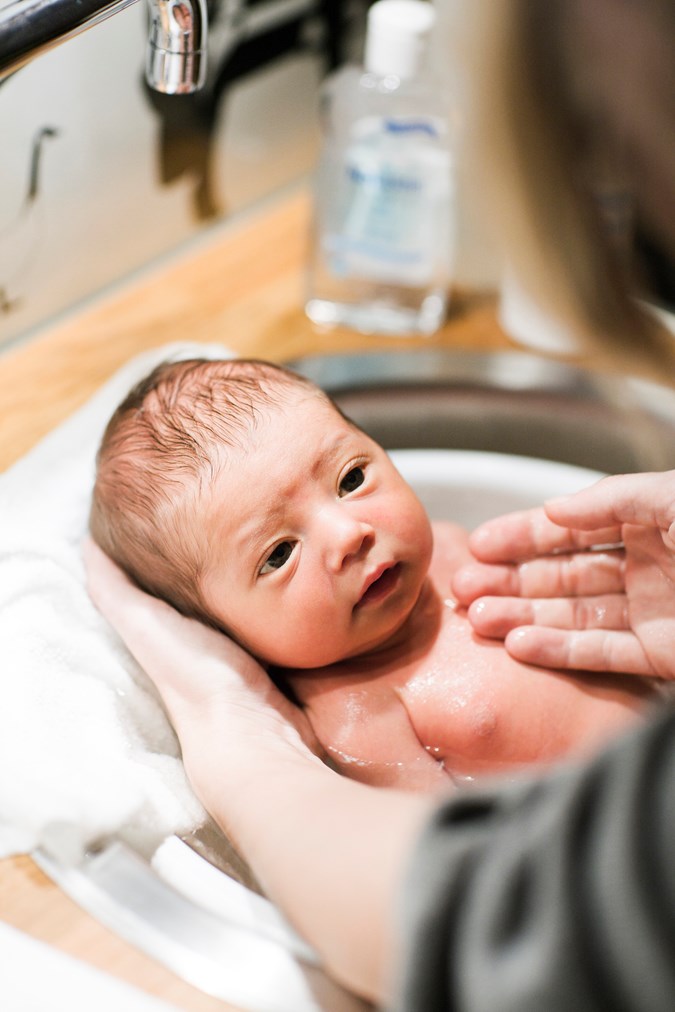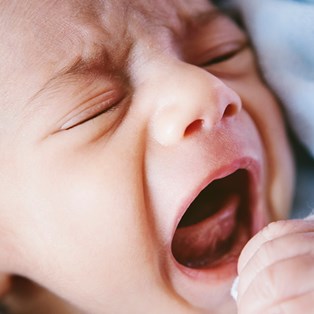How to help your windy baby

Our simple tricks and tips will help ease your baby's wind pain
By Practical Parenting team
September 03 2019
It’s normal for babies to have ‘wind’ or ‘gas’ but when it gets trapped or there’s too much, it becomes painful and makes little ones unsettled - but you can help.
Many babies pass wind frequently without crying; some cry for a short time before they pass wind and become instantly happy afterwards; others are unsettled and squirm five minutes into a feed or at the end of a feed and some seem to be in pain or discomfort for most of the day and night.
Wind may or may not be smelly and can be relieved in different ways.
The challenge is working out where along the digestive tract the wind is trapped and what has caused the excess wind in the first place. Finding a likely cause and locality is important as it gives carers an idea of how to relieve bub’s discomfort and help her feel more settled.
A difficult and complicated birth can result in compression trauma around the base of your newborn’s head. This compression can irritate the vagus nerve that is responsible for the body’s ability to rest and digest. This nerve irritation can cause poor digestion and unsettled behaviour.
Babies are unique. How they get wind and how they get rid of it varies. For some, it is just a matter of waiting until they are around four to six months of age before discomfort improves (which can feel like a lifetime when you have a newborn), but for others, changing your diet (if you are breastfeeding - see below) or changing the feeding routine helps.
If you're really worried about your baby being in pain or having severe wind pain, then it's best to see your doctor.

Getty
Different births
If your little one was born premature, she is likely to suffer from wind discomfort due to an immature digestive system. Bubs born by caesarean are also susceptible to wind pain. This is because during vaginal birth bub ingests a mouthful of ‘good’ bacteria on the way through the birth canal, which does not occur during a caesarean-assisted birth.
The reduced amount of rich and diverse bacteria affects healthy gut microflora and ongoing bacterial colonisation in bub’s gut, which can cause wind discomfort. Breastfeeding is the best way to improve gut flora but often lactation is delayed for these mums and infant formula may become a milk of choice.
How do I know my baby is in pain from wind?
When your bub has pain in her bowel it usually comes in waves. She will be happy and settled one minute and cry and curl her legs up the next. She might grimace and give a startled cry. Here are some techniques to ease the pains.
1. Belly rubs
A simple massage may be all it takes to ease that built-up gas. Rub your baby's tummy in a circular motion, going clockwise from the right side, under the ribs and down the left side following the large intestine – this helps the gas bubbles move along the digestive system.
Many parents swear by a technique to make their baby pass wind or fart. Gently massage the baby under the rib cage, in a circular motion on the left side. Check out the video below for tips to making it work.
2. Bicycle leg movements
Lay your baby down on her back, and move her legs gently as though she is riding a bicycle. Four bicycle kicks followed by a lift of both legs, gently is often enough to do the trick.
Don't try this straight after a feed but a couple of times during the day.
3. Bum Sinks.
Sit with your baby seated in your lap, and lift her feet so that they’re higher than her bum This can help the pelvic floor muscles to relax and will create pressure in the abdomen.
4. Pause a feed for a burp
It's a good idea to slow down your baby's feeds and literally pause so your baby can burp or pass wind during the feed. They won't feel as full. Sit them up and gently rub their back or pat it before continuing with either the breast feed ora bottle.
There are three positions that are good for burping a baby, but experiment with your baby's likes and dislikes. Try all of them, as you may find one works better than another.
- Hold your baby up to your shoulder. Place your baby slightly over your shoulder with her bottom supported by your arm on that side. Your shoulder can help get that air out. With your other hand, pat or rub her back. As your baby is stretched out and upright, this is often the easiest position to get her to burp.
- Sitting up: Sit your baby on your lap with her back to your tummy. Hold her under the chin with your other hand.
- Face-down on your lap: Place your baby face-down on your lap. Hold her firmly but gently with one hand and pat or rub her back gently with the other.
You may notice the belly aches come and go but seem to be worse when bub is lying flat. It's similar to when adults get indigestion when they try to sleep after a big meal. Try keeping your bub upright to help the wind get down and out. Hopefully wearing bub in a harness or baby carrier during the day can help alleviate gas and lead to a more comfortable night.
6. Frog-kick
Lie your baby on her back and pretend that she's doing breaststroke. Guide her legs to do that swimming motion but on her back. This can help ease a tummy ache and help the wind and gas come out.
7. A warm bath
Doesn't that fix everything?! Warm water may help relax those little tummies and aid in soothing the pain that cramps can cause. Just have a few extra towels on hand, in case the warm water relaxes those the bowels!

Getty
Colic
If you are struggling to find answers, it can be a difficult time for everyone concerned because sometimes there simply is no answer.
That’s when wind is labelled colic. If this sounds like your life at the moment, try to relax and get as much support as you can. Bubs generally grow out of wind discomfort with no lasting effects or memory of these difficult days.
Formula-fed babies
Formula is manufactured and scientifically tested to be as close to breastmilk as possible and is a suitable alternative to breastmilk. However, it is generally harder than breastmilk for bub to digest and undigested milk produces offensive wind. Bubs fed on formula are more at risk of wind discomfort from being overfed, becoming constipated, and gulping air.
Breastfed babies can contain lactose (milk sugar), causing abdominal bloating and discomfort. This overload may be from an insufficient amount of the enzyme lactase, needed to break down lactose, or from ingesting too much foremilk containing lactose. It is recommended that you seek specific feeding advice from a lactation consultant or child health nurse in these situations.
Your diet
Gas is formed as a by-product of some foods. If you are breastfeeding or your baby has started solids, the same foods that cause gas in one bub won’t necessarily cause gas in another.
For this reason, don’t withhold too many suspected ‘wind-producing’ foods for too long unless you find not having them helps bub settle.
Reducing and eliminating some foods from your diet (if you are breastfeeding) such as chocolate, milk, ice-cream, fruit juice, soft drinks, processed foods, and fruit have been found to reduce wind in many breastfed little ones.
Foods that produce painful gas may not continue to cause discomfort so it is important to rechallenge your child with foods as she matures.













